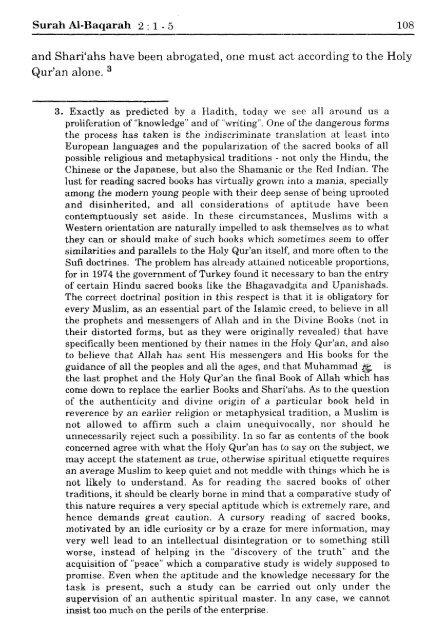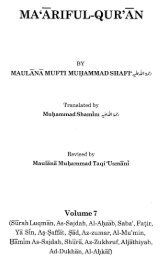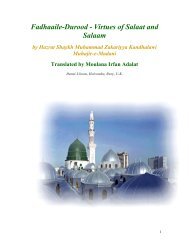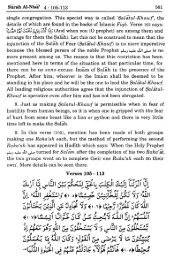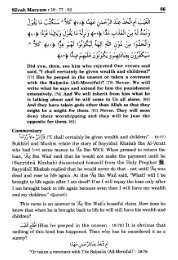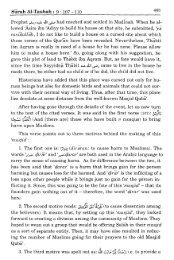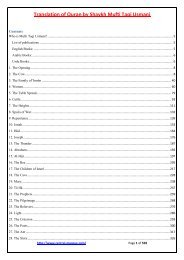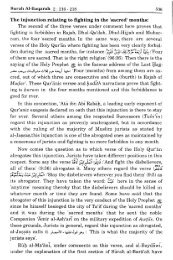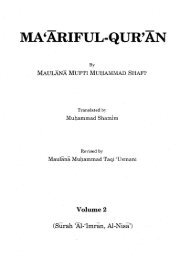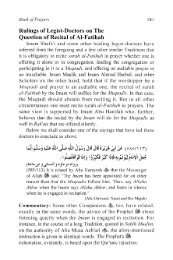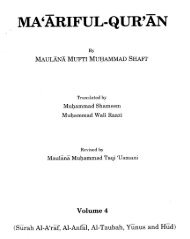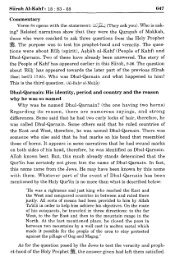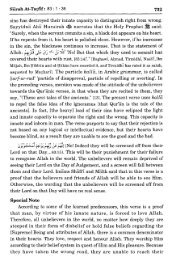Maariful Quran - Mufti Shafi Usmani RA - Vol - 1 - Page
Maariful Quran - Mufti Shafi Usmani RA - Vol - 1 - Page
Maariful Quran - Mufti Shafi Usmani RA - Vol - 1 - Page
Create successful ePaper yourself
Turn your PDF publications into a flip-book with our unique Google optimized e-Paper software.
Surah Al-Baqarah 2 : 1 - 5 108and Shari'ahs have been abrogated, one must act according to the HolyQur'an alone.3. Exactly as predicted by a Hadith, today we see all around us aproliferation of "knowledge" and of "writing". One of the dangerous formsthe process has taken is the indiscriminate translation at least intoEuropean languages and the popularization of the sacred books of allpossible religious and metaphysical traditions - not only the Hindu, theChinese or the Japanese, but also the Shamanic or the Red Indian. Thelust for reading sacred books has virtually grown into a mania, speciallyamong the modern young people with their deep sense of being uprootedand disinherited, and all considerations of aptitude have beencontemptuously set aside. In these circumstances, Muslims with aWestern orientation are naturally impelled to ask themselves as to whatthey can or should make of such books which sometimes seem to offersimilarities and parallels to the Holy Qur'an itself, and more often to theSufi doctrines. The problem has already attained noticeable proportions,for in 1974 the government of Turkey found it necessary to ban the entryof certain Hindu sacred books like the Bhagavadgita and Upanishads.The correct. doctrinal position in this respect is that it is obligatory forevery Muslim, as an essential part of the Islamic creed, to believe in allthe prophets and messengers of Allah and in the Divine Books (not intheir distorted forms, but as they were originally revealed) that havespecifically been mentioned by their names in the Holy Qur'an, and alsoto believe that Allah has sent His messengers and His books for theguidance of all the peoples and all the ages, and that Muhammad $$ isthe last prophet and the Holy Qur'an the final Book of Allah which hascome down to replace the earlier Books and Shari'ahs. As to the questionof the authenticity and divine origin of a particular book held inreverence by an earlier religion or metaphysical tradition, a Muslim isnot allowed to affirm such a claim unequivocally, nor should heunnecessarily reject such a possibility. In so far as contents of the bookconcerned agree with what the Holy Qur'an has to say on the subject, wemay accept the statement as true, otherwise spiritual etiquette requiresan average hluslim to keep quiet and not meddle with things which he isnot likely to understand. As for reading the sacred books of othertraditions, it should be clearly borne in mind that a comparative study ofthis nature requires a very special aptitude which is extremely rare, andhence demands great caution. A cursory reading of sacred books,motivated by an idle curiosity or by a craze for mere information, mayvery well lead to an intellectual disintegration or to something stillworse, instead of helping in the "discovery of the truth" and theacquisition of "peace" which a comparative study is widely supposed topromise. Even when the aptitude and the knowledge necessary for thetask is present, such a study can be carried out only under thesupervision of an authentic spiritual master. In any case, we cannotinsist too much on the perils of the enterprise.


